All about the new Google Advanced Data Analytics Professional Certificate.
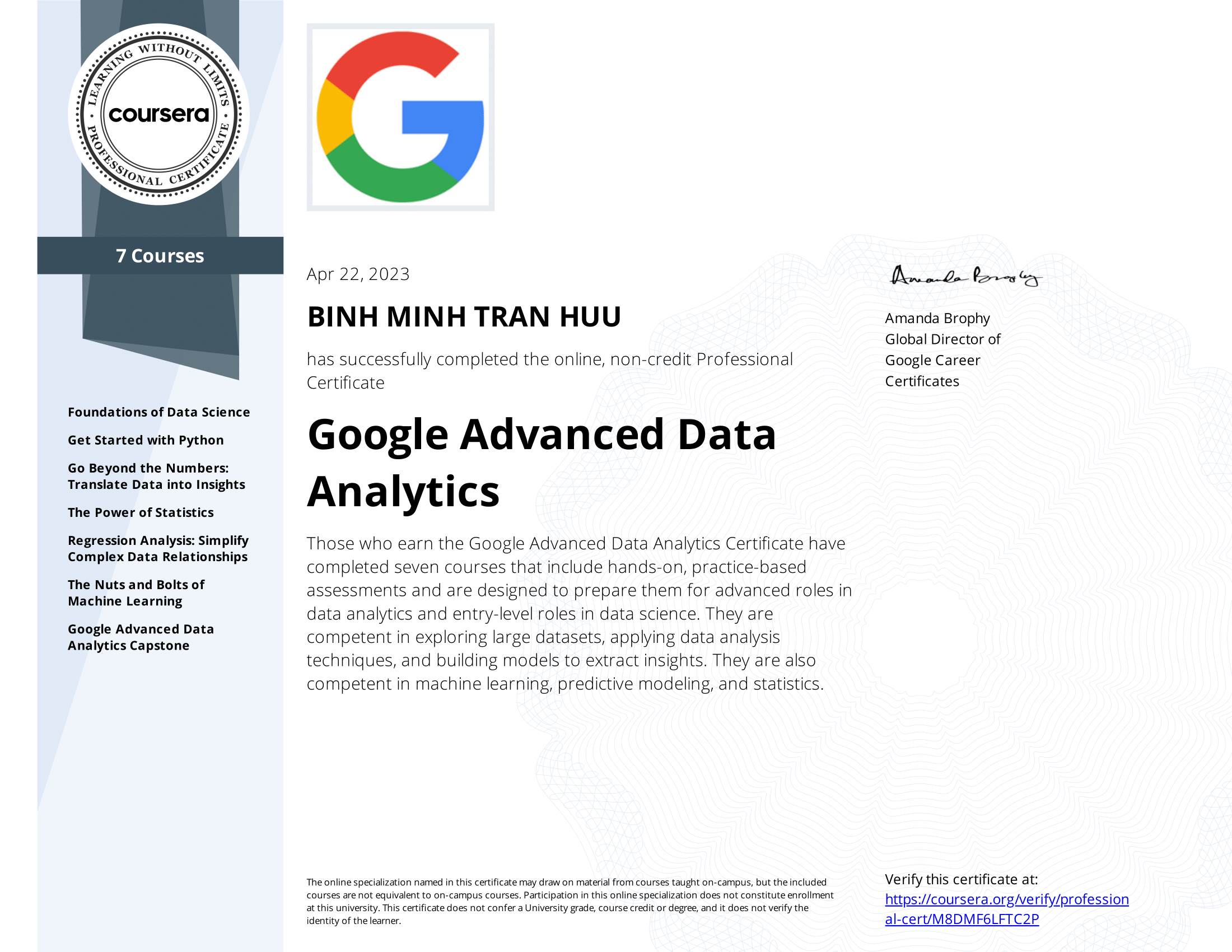
Tags:
data-science AI machine-learningDescription:
As one of the first people enrolled and finished, this is my review of what this Advanced program has to offer.
My Verdict
Yes, the Google Advanced Data Analytics Certificate is certainly worth the investment, and it is one of the best online courses in the field to prepare learners the necessary knowledge, not only to excel in Data Analytics tasks, but also to well fit in a professional working environment.
Overview
The certificate offers over 200 hours of content on machine learning, data visualization, statistics, and predictive modeling using Python. Completion of the course often require 6 months, assuming learners spend about 10 hours per week on the course.
However, one thing to keep in mind that this is not a certification for beginners. According to the course description, it is specifically intended for those who have completed the Google Data Analytics Certificate (the non-advanced one) or have equivalent data analytics expertise.
The Google Advanced Data Analytics certification includes seven online courses. The Certificate is given when all seven courses are passed. Each course is then divided into several weeks, often from 5 to 7. At the end of each week, there will be an exam used to grade your knowledge. Learners must finish all the weekly exam with scores of at least 80% each exam in order to pass the course. Although learners have unlimited tries, the questions change after every try, and test takers can only try after 24 hours after failing 3 tests. Therefore, it is not likely that one can pass the course by only remembering the answers.
The course teaches learners how to:
- Understand the roles, responsibilities and workflows of data professionals.
- Collect, analyze, interpret, manipulate, and visualize large data sets using advanced data analytics techniques.
- Use machine learning techniques to discover patterns in data.
- Use predictive modeling, regression models, and experimental design.
- Show insight from data analysis to interested parties.
- Use popular tools like Jupyter Notebook, Python, and Tableau for data analysis purposes.
Course Contents
The Google Advanced Data Analytics Certificates requires completion of seven courses:
1. Foundations of Data Science
This chapter provides an introduction to the world of data science and analytics. It starts by overviewing important data science concepts, then introducing the impact of data on the world today. Afterward, the fun begins with about 10+ hours of introduction of the data professional career path, as well as workflows for data projects.
Overall, this Foundation course could be redundant for people that have years of actual experience in the field. However, for newcomers (myself included), this course is worth-taking to have solid backgrounds on data science and data analytics. The biggest thing I learned from this section is the PACE (Plan, Analyze, Construct, Execute) workflow and how to apply it to business settings.
The final exams of this course does not ask any deep technical questions, but most of them are about general concepts, therefore it should not create too many problems for learners.
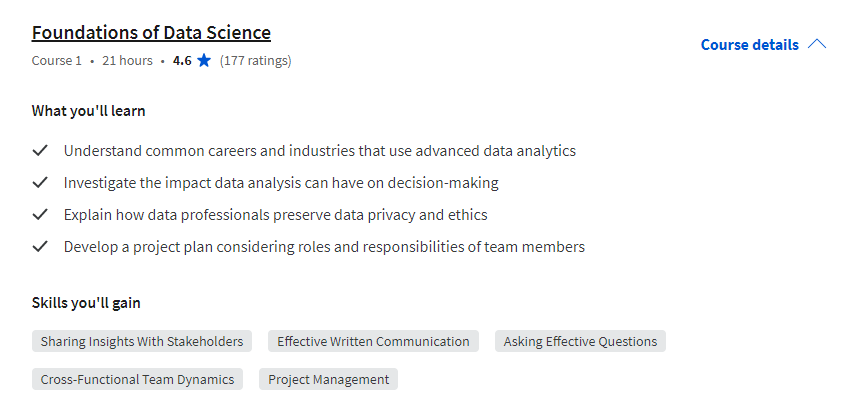
2. Get Started with Python
After the Foundation, the course jumps directly into a more technical part, where learners are expected to study Python through a data analytics-focused approach. The tool used is Jupyter Notebook via an integrated environment on the Coursera platform.
Compared to the non-advanced course using R, Google's decision to use Python here is very appreciated, since Python is a much more popular programming language that has applications not only in data analytics but also further down in Machine Learning, AI, and also other related fields of science.
For experienced Python users, this course is not very hard to complete, and the final exams should not be a big challenge. As a result, for this demographic, this course should take a lot less time to finish than the average time of 25 hours recommended by Google.
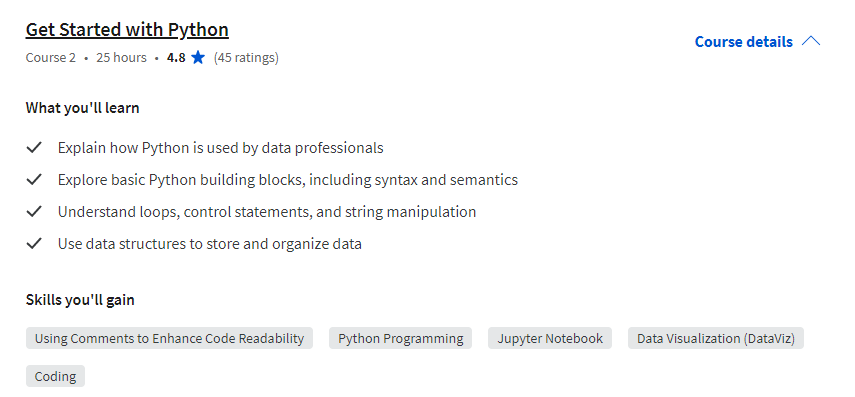
3. Go Beyond the Numbers: Translate Data into Insights
This course focuses on Exploratory Data Analysis (EDA), data cleaning and data visualization.
Most of the important theories are introduced right in the first week, such as EDA, how to integrate EDA with the PACE framework, and case studies on how real-life companies use these methods to solve data analysis problems.
Both week 2 and week 3 focus on using Python for data manipulation, such as sorting, cleaning, filtering, transforming. Week 4 focuses on data visualization using Tableau. However, I would love if the course also introduces other arguably more popular visualization tools such as Seaborn, Ploty or Matplotlib, instead of only Tableau.
Overall, after learning about Python in the second course, this course is where we get our hands dirty by actually doing the basic Data Analytics works. In my opinion, this is the most important course for new learners in the field, because it introduces the basic techniques required for any Data Analytics projects.
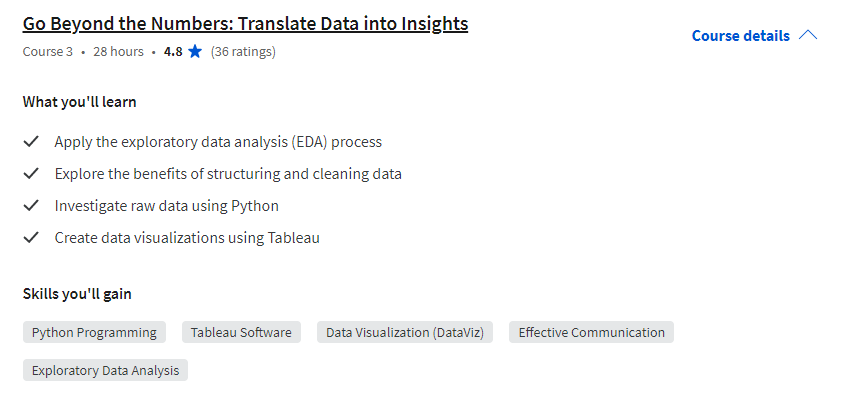
4. The Power of Statistics
If the previous course is the most important for newcomers, then this course is probably the most important course for advanced learners in my opinion. It teaches the concepts related to statistics, probability, sampling, hypothesis testing, and how to do all of them in Python. Since Data Science is arguably just "applied statistics", having a solid background in this statistics will definitely enable learners to digest more advanced concepts later on.
Week 1 of the course focuses on the role of statistics in Data Science and how to use Python to do statistics. The rest of the course introduces concepts of probability, sampling, confidence interval, and hypothesis testing, complemented by many well-made Python labs.
Since learners are expected to know all the important concepts already at this point, the final project provides a very realistic business project with PACE strategy document, statistical analysis, and executive summary reporting.
Due to heavy focus in mathematical concepts, the final exams in this section is a little hard in my opinion, if you do not have strong background in statistics. However, if you follow the materials well, you should not face any big problems.
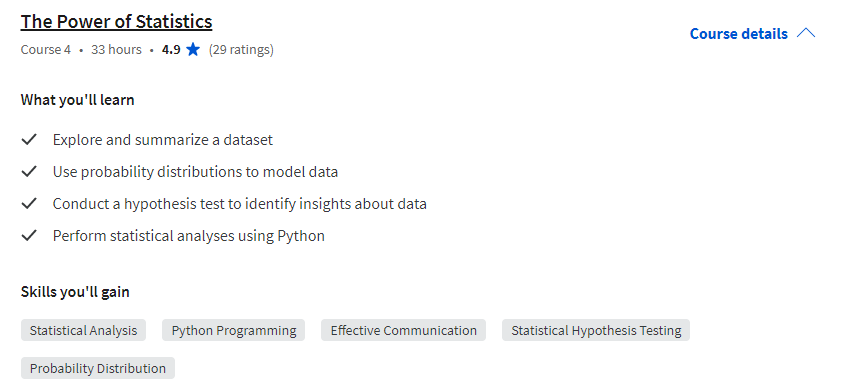
5. Regression Analysis: Simplify Complex Data Relationships
Although the previous course is hard, but this course is probably even harder for most people, since it touches advanced topics related to regression analysis with a ton of concepts and keywords to remember and understand.
The first two weeks goes easy on learners with simple linear regressions model, but things heat up in week 3 with multiple regression and then week 4 with Chi-squared test and analysis of variance (ANOVA).
Week 5 and 6 teaches learners how to build a binomial logistic regression model. In my opinion, this week is the most interesting one since it introduces how data professionals use this type of model to gain insights from their data using actual projects.
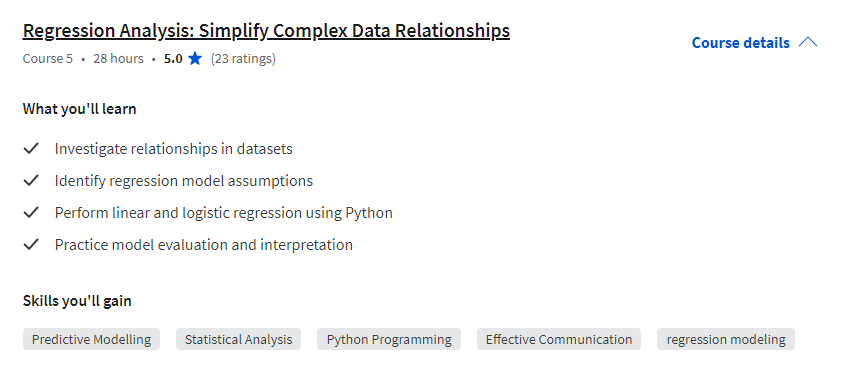
6. The Nuts and Bolts of Machine Learning
Machine learning is not Data Science itself, but it is a powerful tool to do Data Science. In the world where AI are talked about everywhere nowadays, who doesn't want to know a bit about Machine Learning and AI? Right? This course accommodates that by introducing to learner the basic concepts of machine learning and how to use it to solve data science problems.
As a person just recently step into the world of Machine Learning, this course is by far the most fun for me to learn.
The basic algorithms revolving around k-means clustering, random forest, and Naive Bayes are well introduced in the course in an easy-to-understand manner. However, the concept of deep learning is only briefly introduced, thus leaving me somewhat disappoint because I did expect more in-depth explanations for deep learning.
Despite the shortcomings, this course is definitely the most interesting one for really advanced Data Analytics learner who want to excel in the field of Data Science. Highly recommended.
Also, do not expect easy final exams. They will definitely cause you troubles if not prepared.
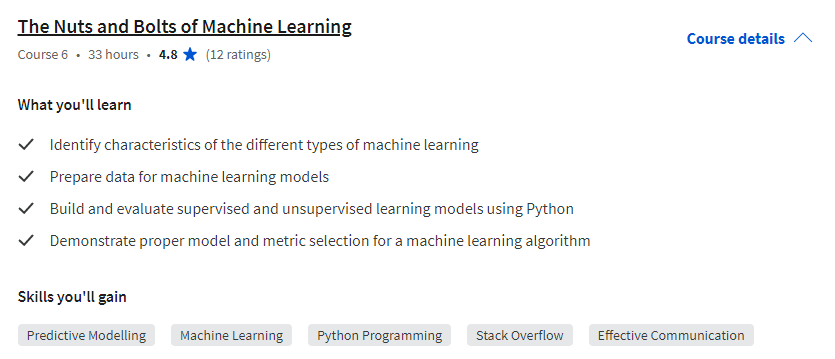
7. Google Advanced Data Analytics Capstone
This is where everything comes together in order to finish a final project with a pretty interesting scenario. Overall, if learners understand all the concepts from previous courses, this course should not create any problems.
Besides, this course introduces learners how to prepare a good CV for data professional jobs, which is a welcomed addition.
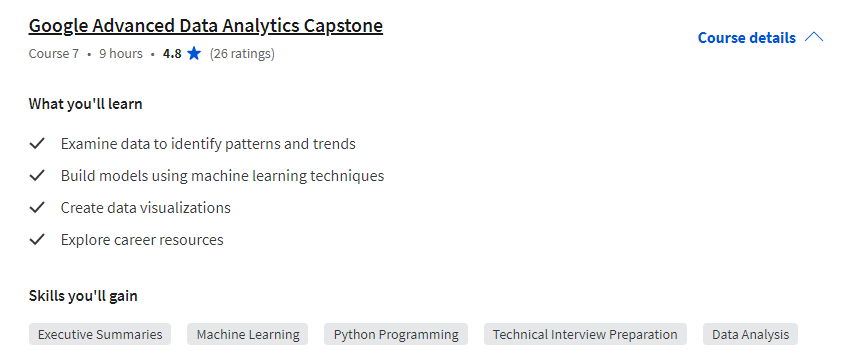
Conclusion
In conclusion, the Google Advanced Data Analytics Professional Certificate is an excellent choice for learns looking to understand advanced data analytics techniques, statistics, and machine learnings.
This certificate program provides a great foundation not about for engineering and science concepts, but also about team communication, project managements, professional workflows, etc., which will have values transcend the boundary of the data science field. For learners want to get a grasp of how projects are done at Google, this is a must-take course.
